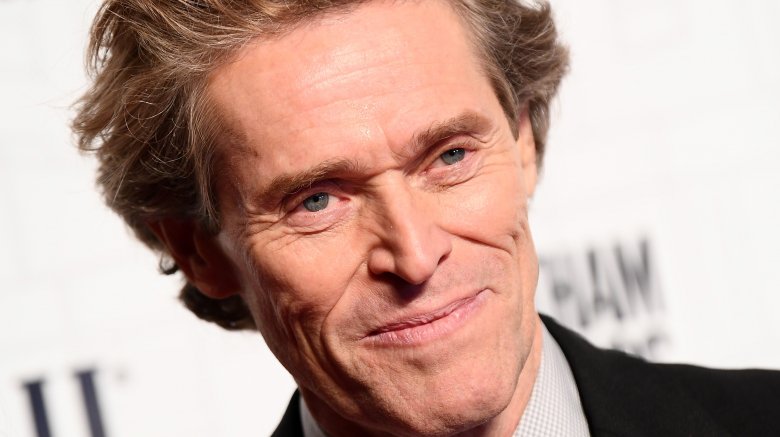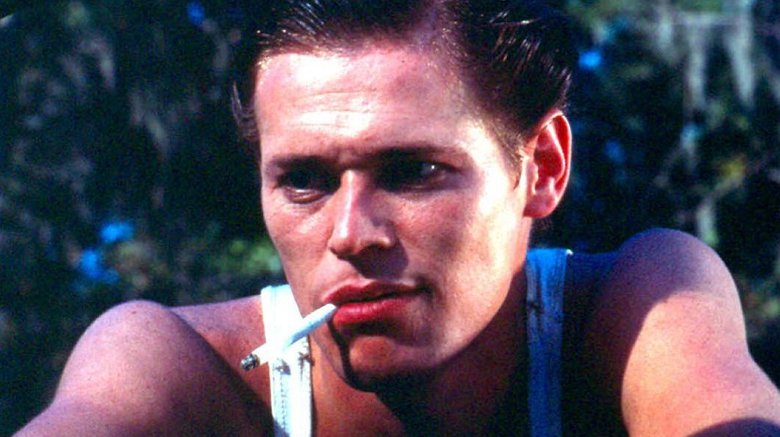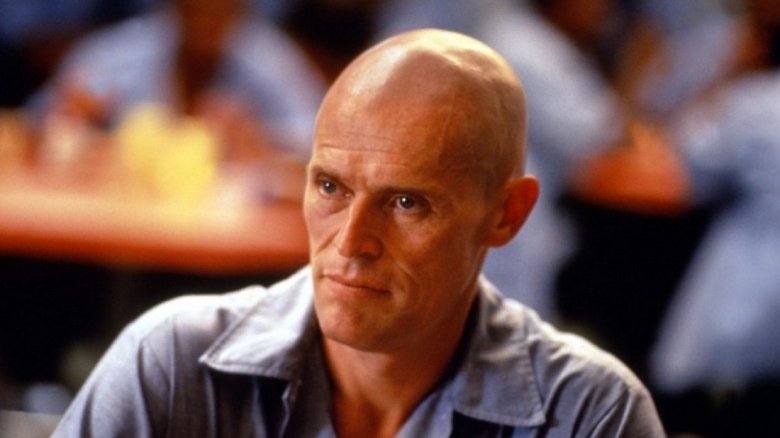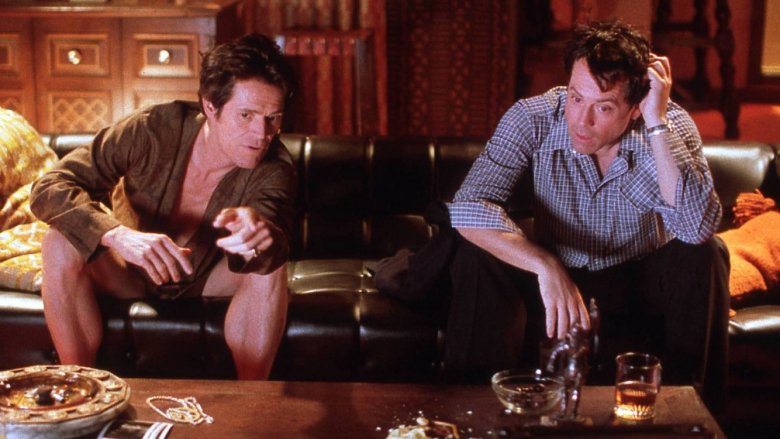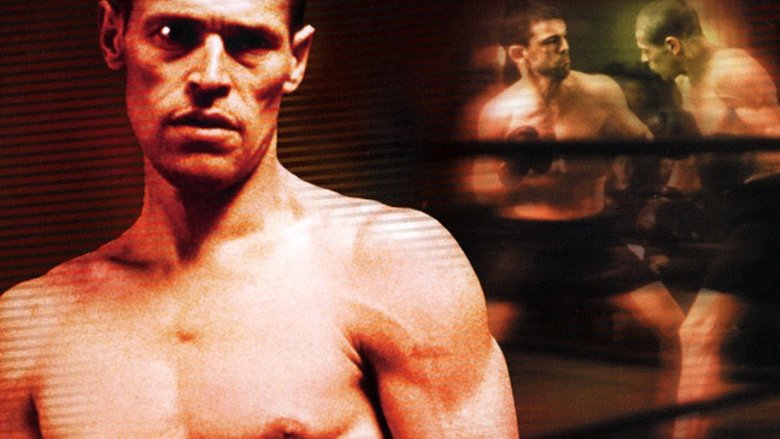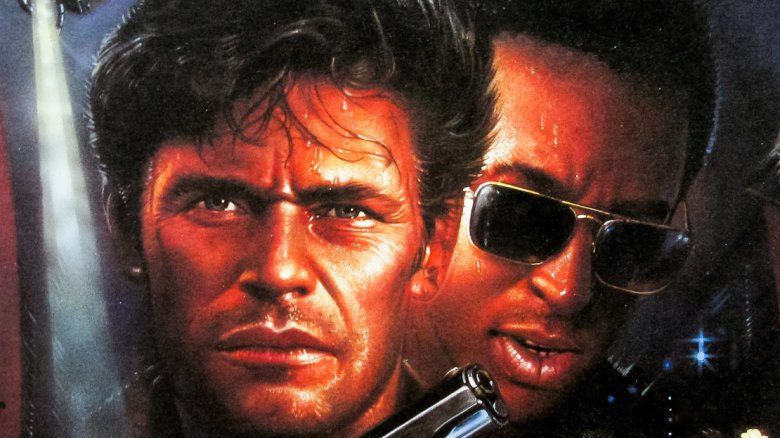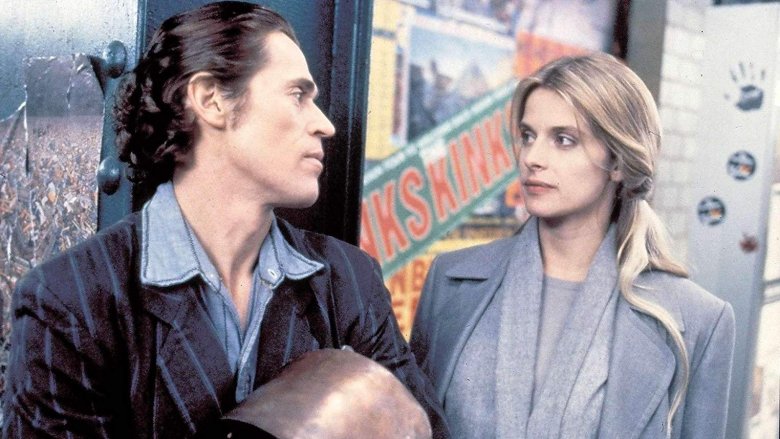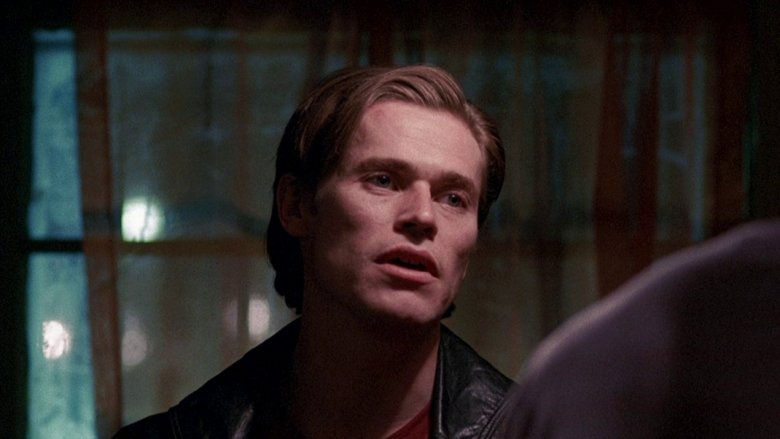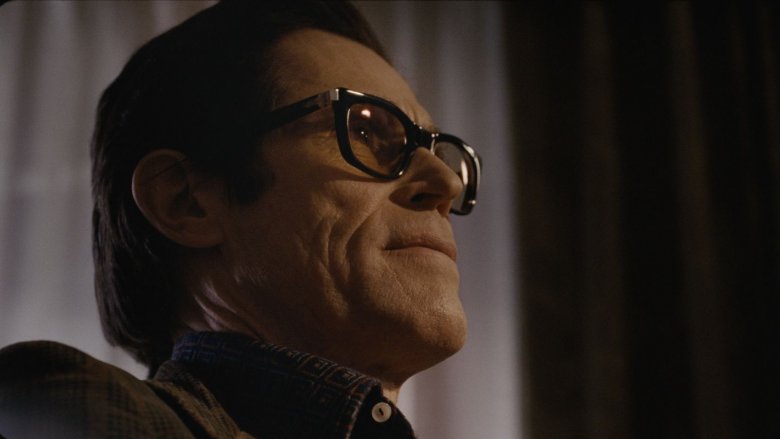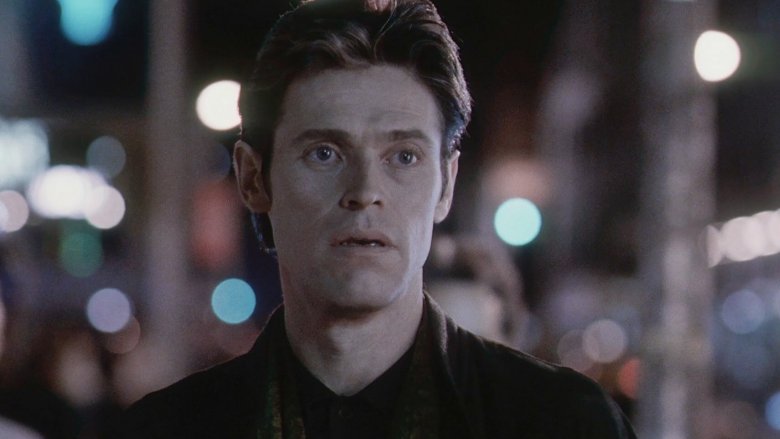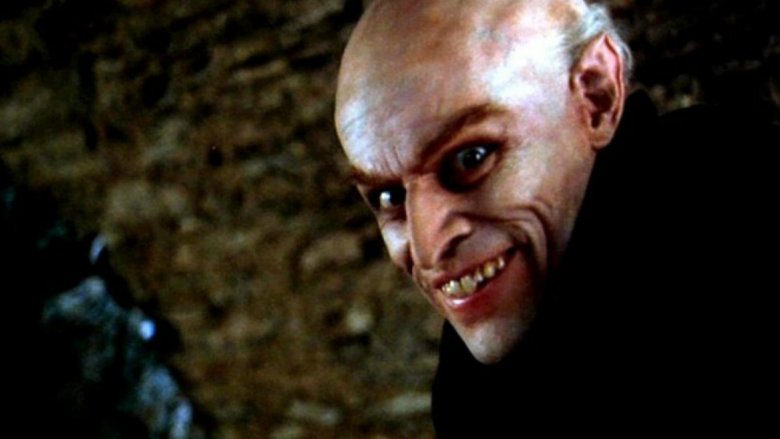The Best Willem Dafoe Movies You Haven't Seen
Willem Dafoe's acting career can safely be considered legendary. From playing blockbuster bad guys like Spider-Man's Green Goblin to animated antiheroes like Finding Nemo's Gil, he's conquered cinema across medium, decade, and genre. But like many film stars, Dafoe's experienced plenty of ups and downs at the box office over the course of his distinguished career — when it comes to a filmography this rich and varied, invariably certain gems become hidden, overshadowed by the big hits and unfortunately destined to be discovered only by the most tenacious hardcore fan. But just because these releases may not have been afforded the attention they deserved the first time around, that doesn't mean fans can't go back and discover them now — and we're here to make that journey a bit easier by looking back over his many years in the film industry and rounding up the best Willem Dafoe movies you haven't seen.
The Loveless (1981)
Kathryn Bigelow's first feature-length movie is a sharp-eyed look at midcentury gangster culture that most film fans still haven't seen, featuring Willem Dafoe as bad boy Vance, a "regular Joe... with an itch between his legs and an afternoon for a heart." The stopover he and his gang make in a small Southern town is supposed to a be brief detour on the way to something bigger, but their appearance rocks the community in ways no one could have anticipated. This is a movie that unabashedly embraces 1950s nostalgia: the engines rev noisily, the leather is slick, the hair is greased, and the Coke is always fresh from the branded crimson fridge. But The Loveless never dips into slavish sentimentality. Vance is unquestionably cool, and Dafoe plays it up with more than a few sultry looks and an ever-present purr in his voice, but he leads an untenable lifestyle against a way of life the audience knows is already in the process of crumbling. Oblivious to the tragic figure he cuts, Vance poses the question: Is burning out okay as long as you lit up the sky beforehand?
Animal Factory (2000)
Alongside the storied and steely-eyed likes of Danny Trejo, Mickey Rourke and Steve Buscemi, Willem Dafoe stars as Earl Copen in this bleak, little-seen exploration of the triumph, violence, and compromise of prison life. Ron Decker (Edward Furlong), a fresh-faced newcomer put behind bars for drug possession, is quickly taken under Copen's wing upon entry to the dizzying hierarchies, alliances, and blood feuds that make up the world of San Quentin State Prison. Despite foiled attempts at sentence reductions and breakouts, Copen and Decker's relationship holds strong and ultimately deepens into a bond of mentorship that becomes nearly paternal. Dafoe's gritty resilience is impressive in and of itself, but it's the sacrifices he makes, up to and including his freedom, that resonate long after the film's end. As he notes in an allusion to Paradise Lost, he might be reigning in hell, but it's better than serving in heaven.
Auto Focus (2002)
Willem Dafoe plays John Henry Carpenter, friend and accused murderer of celebrated DJ, drummer, and Hogan's Heroes star Bob Crane in this rollicking biopic. We watch Crane (Greg Kinnear) tumble precipitously, over the course of 105 biting minutes, from clean-cut family man to sex-addled sleazeball, largely due to Carpenter's lascivious influence. Dafoe inhabits the cunning electronics salesman with purring relish, filling every frame he's in with an infectious lust. Who needs wholesomeness when you can have fun, he asks the audience? What is goodness really worth if you're not enjoying it? Do you want to look back on your life and realize you never lived for yourself? It's a shame this is one of the Willem Dafoe movies most people haven't seen, because Auto Focus is Dafoe leaning into all that makes him so effective in portraying some of the most off-putting characters of the last few decades: His voice is low, his gaze is intense, and he seems almost to loom out of the screen, rather than fill it. But above all, even at his most grotesque, he makes you wonder if he has a point.
Triumph of the Spirit (1989)
Impossible choices dominate this little-seen film, in which Willem Dafoe inhabits the real-life story of Salamo Arouch, a Greek-Jewish Auschwitz inmate who was forced to fight his fellow prisoners as entertainment for the SS. Formerly a longshoreman in his native Thessaloniki, Arouch perseveres in his grim sport for the love of his family and his fiancee Allegra, interned alongside him. If he wins, they stand to inherit his extra rations and a thin level of safety. If he loses, they are at even greater risk. Dafoe channels the most dire sort of fortitude in this journey into darkness — the sort that demands he condemn his innocent opponents to death for the sake of those he loves. He knows exactly what will happen to them and their loved ones once he beats them into submission. He fights, in large part, to ensure it doesn't happen to him and his. Despite the hopeful title, Dafoe's performance asks the question: how far are we willing to go to survive?
Off Limits (1988)
On the list of Willem Dafoe movies inspired by the Vietnam War, 1988's Off Limits is easily the one most people haven't seen. Far less well-known than Platoon, Dafoe's previous Vietnam War-era film, it finds him portraying Sergeant First Class Buck McGriff, a grizzled USACIDC agent investigating a string of mysterious murders taking place in the part of Saigon then off limits to military personnel. Alongside Sergeant First Class Albany Perkins (Gregory Hines), he encounters obfuscation, corruption, careful cover-ups, and even a suicide in a quest to confront and capture the murderer. Dafoe is relentless in this 1980s action thriller, the kind of antihero who relishes the grime and sin of the streets he patrols. "Civilians, troops, gangsters, deserters, dopers, black marketeers... I love this town," he remarks with something not unlike cheerfulness, as he and Perkins cruise through the shadowed labyrinth of the city. In contrast to the more straightforwardly villainous roles in which Dafoe is so often cast, this sort of gleeful, yet ultimately heroic, connoisseur of crime is a refreshing departure.
Faraway, So Close! (1993)
As a starry-eyed fantasy — the sequel to Wim Wenders' Wings of Desire — involving angels, trapeze artists, and time travel, this sticks out like a gilded thumb on the list of Willem Dafoe movies. Like many Wenders works, it was destined to play on the arthouse fringes of the mainstream, which means you probably haven't seen how Dafoe shines as the embodiment of time itself, disguised as the menacing, law-stretching Emit Flesti. As a movie that is artful bordering on twee, this is an opportunity to watch Dafoe approach a very different sort of performance. His character is, by its very nature as an omnipotent power, notably strange, even against the movie's backdrop of colorblind angels who just want to live, laugh, and love amid the hustle and bustle of reunited Berlin. Yet he is as successful as ever, in part because of how vaguely out of place he seems. The audience detects something off about him from the beginning, and has their suspicions rewarded by the film's end. It's casting that works behind and beyond the fourth wall.
To Live and Die in L.A. (1985)
Many of the best Willem Dafoe movies take advantage of his ability to embody moral ambiguity, and To Live and Die in L.A. is a perfect example. Dafoe plays expert counterfeiter Rick Masters in this twisty crime thriller. Pursued by Richard Chance (William Petersen), he's a brilliant, boastful artist who likes to flaunt the fact that he's "an easy guy to find" because he knows he's just that good at what he does — and getting away with it. And indeed, you can't help but root for him a little as you watch him sneer and succeed. At his drafting table, the cunning skill with which he slices, lines, pastes, and otherwise magics money into thin air dazzles even the most law-abiding audience. Dafoe's smooth, assured attitude fits right in amidst the film's gripping chase sequences and stylish set pieces: All that's good about 1980s action is here to enjoy, and his performance is chief among it. Masters is great at faking it, and he's not interested in pretending otherwise. It's Chance's job to see if he's capable of cutting that sort of polished, professional self-assurance down to size. If you haven't seen To Live and Die in L.A., you're in for a treat.
Pasolini (2014)
1970s Rome is a sensuous carnival and Willem Dafoe's Pier Paolo Pasolini is its ringmaster in this moody look at the final days of the famed director. A controversial figure even today, Pasolini, over the course of this movie, finishes shooting Pasolini's 120 Days of Sodom (a film the Chicago Film Critics Association deems the 65th scariest ever made), begins a relationship with a young man who ultimately spurns him, and is finally murdered with his own car. Dafoe's performance embraces the man's interest in the taboo, making it frankly clear to all that he has seen and lived through things others would prefer to ignore, and that he isn't about to let them. Dafoe's Pasolini is not a man who enjoys brutality — rather, he is a man unflinching in his chronicling of it, and utterly uninterested in compromising this vision. Whether the world is ready to receive it, however, is another matter.
Light Sleeper (1992)
Many Willem Dafoe movies remain critical favorites that most people haven't seen — and writer-director Paul Schrader, who met Dafoe while the pair were working on Martin Scorsese's The Last Temptation of Christ, knows that level of cult appreciation all too well. The duo reunited for the little-seen Light Sleeper, starring Dafoe as John LeTour, a man who delivers drugs for kingpin Ann (Susan Sarandon) in the neon-limned dreamworld of 1990s New York. Ferrying "white drugs to white people" is interrupted by the reappearance of Marianne, LeTour's old girlfriend — and all the memories, temptations, and mistakes she drags along behind her. Alienation is the watchword of this aloof look at the dirty work done in the shadows of glamor, and Dafoe channels it into every mournful gaze he gives the camera. This is his life, and it amounts to an endless race between the terrible people he serves, highlighted only by the chances at something better he encounters and, more often than not, squanders. He does what he has to survive, no more and no less. But with every remote glance and icy line delivery, Dafoe suggests that he might not have realized the cost to his soul.
Shadow of the Vampire (2000)
Willem Dafoe dives into metafiction in this fictionalization of the making of the horror classic Nosferatu. As Max Schreck portraying the inimitable Count Orlok, he leans into his sinister qualities — principally his skeletal cheekbones and wide, spectral gazes — but his Schreck isn't just a method actor. In this film, Schreck is an actual vampire, lending his authenticity to fantastical director Murnau (John Malkovich) in exchange for the toothsome Greta Schroeder (Catherine McCormack). Though this is a story of genuine horror, Dafoe infuses it with a touch of manic delight, straddling the line between scary and goofy. This is striking on its own, but all the more so for its brilliant evocation of the outright oddness of the original Nosferatu. If this is one of the Willem Dafoe movies you haven't seen, you're missing out — all the period costuming in the world can't recreate the perfectly bizarre quality of Dafoe's leering gaze, shuddering movements, or the high whine in his voice. He's scary because he doesn't conform to our modern concepts of what we should be afraid of — and crucially, he doesn't care. He'll eat us all regardless.
